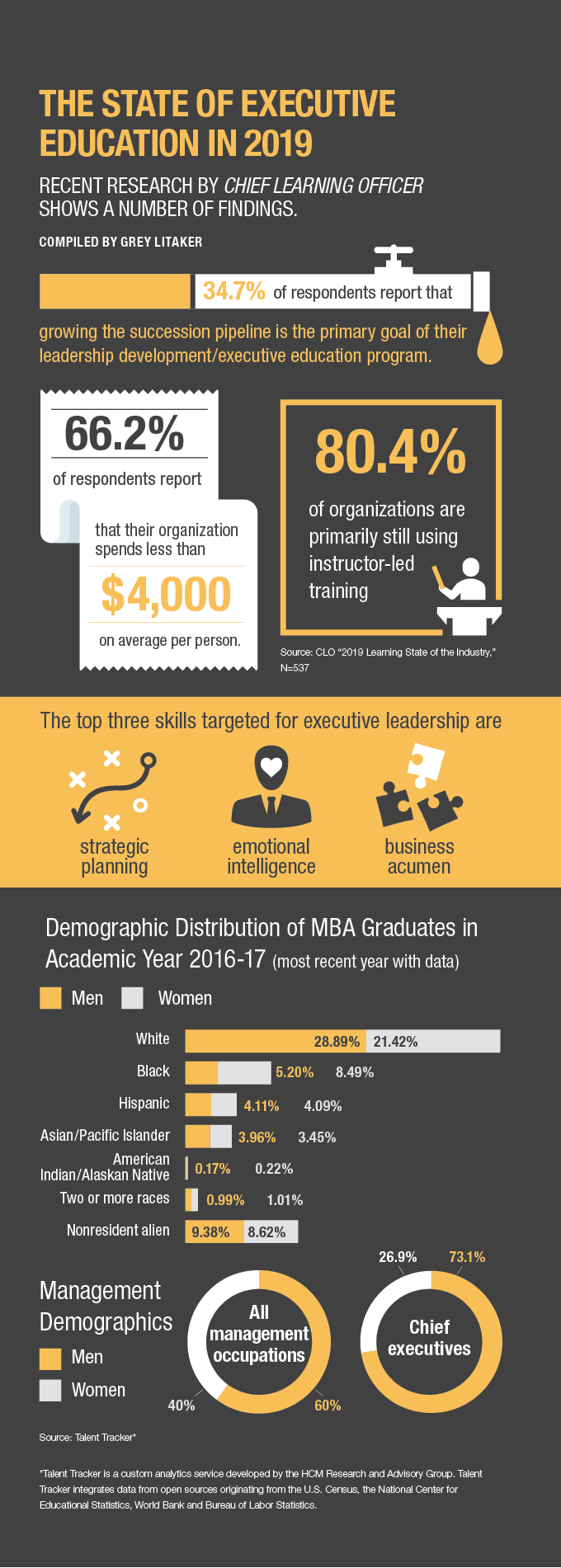The days of sending rising young executives to an MBA program and then considering them fully trained are officially over. Today’s leaders are expected to be lifelong learners, which means they need constant access to fast and cost-effective development programs that build on their skills and abilities while allowing them to expand their network of peers.
“The nature of leadership skills is changing so quickly that a lot of organizations no longer believe traditional education can stay the pace,” said Michael Griffiths, lead for Deloitte’s Learning Consulting Practice in New York. “Leaders need programs that enable them to more rapidly change their skills.”
This doesn’t mean the MBA has lost its value. “Business schools are trying to be more nimble, offering digital degrees and flexible consumption models,” he said. But with so many options, they are now viewed as just one of many learning steps a leader might choose to take.
In many cases, companies are looking for faster and more future-focused programs that will prepare leaders for the changing nature of work. In Deloitte’s “2019 Human Capital Trends” report, the top-rated requirement for leaders was the ability to lead through more complexity and ambiguity, and almost half of respondents (47 percent) felt their leaders need to learn how to manage a workforce that is a combination of humans and machines.
Yet companies are struggling to figure out how to accommodate these needs. Only 30 percent of organization say they are effectively developing their leaders to meet these challenges. “There is a lot of unease about leadership and learning,” Griffiths said.
Leadership and the Future of Work
The pressure to deliver fast and more targeted leadership development is transforming the executive education landscape, pushing universities, corporate education providers, and internal learning and development teams to evolve their content to make it more meaningful and relevant for today’s executives.
“The whole idea of customized content has become a very big part of executive education,” said Michael Chavez, CEO of Duke Corporate Education. Rather than providing leaders with general leadership content and hypothetical case studies, companies want their people to work on real-world, relevant problems that the business is trying to solve. “Every client we work with is going through some transformation, and they see leadership development as key to these efforts,” Chavez said.
 That is causing them to change the way they think about leadership development and what benefits it brings to the organization. Chavez notes that courses about business strategy are less in demand, as companies think more about the specific behaviors and capabilities leaders need to drive the business forward. “Courses on establishing purpose and values, and shaping company culture, are now in demand,” he said. There is also a lot more emphasis on how to encourage collaborative behavior in the workplace because that is seen as an enabler of innovation. “We are doing a lot more change workshops than strategic training programs.”
That is causing them to change the way they think about leadership development and what benefits it brings to the organization. Chavez notes that courses about business strategy are less in demand, as companies think more about the specific behaviors and capabilities leaders need to drive the business forward. “Courses on establishing purpose and values, and shaping company culture, are now in demand,” he said. There is also a lot more emphasis on how to encourage collaborative behavior in the workplace because that is seen as an enabler of innovation. “We are doing a lot more change workshops than strategic training programs.”
This is causing many of the traditional leadership and business management courses to be replaced by more future-focused programs with catchy titles like Customer Focused Innovation (offered by Standford’s Hasso Plattner Institute of Design), Designing Organizations for Digital Disruption (offered by Duke Corporate Education) and Leading Change and Organizational Renewal (offered by Harvard Business School).
However, Chavez admits creating workshops that teach leaders how to leverage technology and change corporate culture is a lot more complicated that teaching basic leadership skills. “I can spend three hours lecturing about strategy, but you can’t do that with culture change,” he said. Instead, training organizations need to create more collaborative lessons and opportunities for leaders to work on real-world business problems in cross-functional teams.
In that environment, bolting a few company-specific case studies onto otherwise general content isn’t enough. Universities and for-profit executive education organizations have to work with companies to build content around their specific leadership challenges and to establish measurable learning outcomes that will tie back to the business strategy to prove their worth. “There is limitless opportunity to create learning content that supports a specific business need,” Chavez said. “But it demands a new way of thinking.”
Programming in the C-Suite
There is also a new crop of digitally focused leadership development courses that introduce leaders to rapidly evolving technologies and help them understand how to be a leader in a workplace driven by artificial intelligence, robotics and other rapidly evolving tools.
Chris Castiglione believes that for leaders to fully understand the digital age of leadership, they need to learn the basics of these technologies. Castiglione teaches a Digital Literacy class for master’s students at Columbia, where he spends half the course teaching students Python, JavaScript and other coding skills. “Companies have so much data that they want to analyze, and Python is a great coding tool for doing that,” he said. He spends the second half of the course teaching them how leaders can leverage these and other technologies to drive business results. “Just because you can use artificial intelligence or blockchain it doesn’t mean you should,” he said. “The trick is knowing when to use them.”
Castiglione doesn’t expect his students to leave the class as coding experts, but he does believe that introducing them to basic skills and vocabulary makes these tools more accessible and allows them to see how new technologies are really just evolutions of what already exists. “If leaders want their companies to take advantage of new technology, they need to stay abreast of these trends,” he said. “Learning to code breaks down some of the barriers and gives them confidence to make decisions.”
In these kinds of courses, it is important to make the connections between technology and leadership, agreed Ed Hoffman, senior lecturer in the Masters of Science in Information and Knowledge Strategy at Columbia University in New York. Hoffman is currently developing a course on the future of work and how leadership must evolve to stay relevant in a more digital landscape. “That doesn’t mean just teaching leaders about artificial intelligence and robotics,” he said. “It’s about connecting these technologies to the human element of leadership to achieve a competitive advantage.”
Networking and Distance Learning
Along with creating new content, course designers are also rethinking how and where leaders are going to learn. The rapid pace of change in virtually every industry means they need to be able to leverage new knowledge and skills quickly, Hoffman said. “Speed, agility and velocity comes down to the right amount of learning at the right time.”
That is pushing many developers to move away from classroom-only courses to put some or all content and communications online, so executives can learn when it is convenient — and without spending days away from their office. Although leaders require more than just a self-paced learning module to develop the skills they need to guide their organizations into the future. “The notion that you can only learn on campus is no longer the norm,” Hoffman said. However, the networking, collaboration and relationship-building that leaders expect to gain from executive education are still important.
Hoffman addresses these seemingly conflicting needs by hosting three four-day intensive on-campus workshops throughout his 16-month master’s program. “It’s an opportunity for them to build connections and trust — things you can’t do from a distance,” he said. The students, who come from all over the world, spend those days learning and networking, then continue to build on those relationships once they return home. “When you do most of your learning at a distance, you really value that time together, to work, eat, drink and socialize.”
Regardless of where executives want to learn, whether they are seeking classic leadership skills, or if they want to learn how to leverage the latest digital innovations, the good news is they have lots of options. “There is a heightened interest in executive education right now, which means there are more players trying to meet the needs of students,” Chavez said. The key is figuring out what your people need to learn, and who can provide the format, content and experiences that will best meet their needs.
Sarah Fister Gale is a writer based in Chicago. She can be reached at editor@CLOmedia.com.















